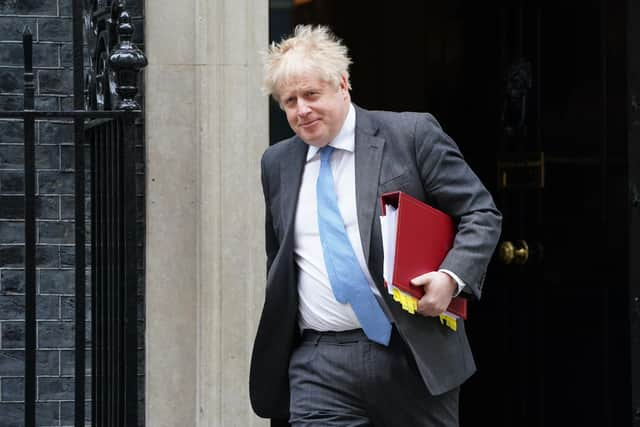Ukraine-Russia: Boris Johnson urges MPs to wear Russian sanctions like 'badge of honour' as Putin cuts gas supplies to Poland and Bulgaria
The Russian foreign ministry moved against 287 members of the House of Commons in response to a series of sanctions on Russian figures over its invasion of Ukraine.
It came on a day that saw further escalation in the conflict, with Vladimir Putin cutting off natural gas to Nato members Poland and Bulgaria in a move described by European leaders as "blackmail".
Advertisement
Hide AdAdvertisement
Hide AdTaking action against MPs, the Kremlin accused the Conservative and Labour members of “whipping up of Russophobic hysteria”.


It argued these politicians involved “took the most active part” in the U.K.’s decision on March 11 to sanction 386 members of the Duma, the lower house of the Russian parliament.
A translation of the Russian foreign ministry statement said the sanctions are being applied “on the basis of reciprocity”.
It added: “These persons, who are no longer allowed to enter the Russian Federation, took the most active part in the establishment of anti-Russian sanctions instruments in London, and contribute to the groundless whipping up of Russophobic hysteria in the UK.
“The hostile rhetoric and far-fetched accusations coming from the mouths of British parliamentarians not only condone the hostile course of London, aimed at demonising our country and its international isolation, but are also used by opponents of mutually respectful dialogue with Russia to undermine the foundation of bilateral co-operation.”
The sanctions list also includes ministers Jacob Rees-Mogg, Amanda Milling and Penny Mordaunt.
Speaker of the House Sir Lindsay Hoyle tops the list of sanctioned Labour MPs, which also includes former frontbenchers Diane Abbott and Barry Gardiner.
The Prime Minister was one of many British politicians to take pride in being on the list.
Advertisement
Hide AdAdvertisement
Hide AdHe said: “It’s I think no disrespect to those who haven’t been sanctioned, when I say that all those 287 should regard it as a badge of honour.
“And what we will do is keep up our robust and principled support for the Ukrainian people and their right to protect their lives, their families, and to defend themselves.
“That’s what this country is doing, and that has the overwhelming support, I think, of the whole House.”
Tory former chief whip Mark Harper said he is “proud” to be included, ex-minister Andrew Murrison said he is “delighted”, while former Brexit secretary David Davis joked: “How will I ever cope?”.
However, the supposed list of “members of the Conservative Party faction in the House of Commons” appeared well out of date.
Charlie Elphicke, who was thrown out of the party and jailed after being found guilty of three counts of sexual assault, was also included, as were Sir Oliver Letwin, Dominic Grieve and Justine Greening despite no longer being MPs.
Speaking during Prime Minister’s Questions, Mr Johnson said: “It’s, I think, no disrespect to those who haven’t been sanctioned when I say that all those 287 should regard it as a badge of honour.
Sir Lindsay said he is “alarmed” at the sanctions, while Labour MP Chris Bryant said he is “absolutely distressed” and “slightly surprised” at not being included in the list.
Advertisement
Hide AdAdvertisement
Hide AdMr Bryant told the Commons: “I can only assume that the Russian Federation accepts that every single thing that I have said about President (Vladimir) Putin over the last few years is true.
"He is a barbarous villain and we must make sure that he fails.”
Foreign Secretary Liz Truss announced the sanctions against the Duma on March 11.
Wednesday also saw Gazprom announce it had cut supplies to Poland and Bulgaria for failing to pay for gas in roubles, representing Moscow's toughest response yet to sanctions imposed by the West.
European Commission President Ursula von der Leyen claimed the EU was prepared for this scenario, and working on alternatives.In a statement, she said: "The announcement by Gazprom that it is unilaterally stopping delivery of gas to customers in Europe is yet another attempt by Russia to use gas as an instrument of blackmail.
"This is unjustified and unacceptable. And it shows once again the unreliability of Russia as a gas supplier.
“Today, the Kremlin failed once again in its attempt to sow division amongst member states. The era of Russian fossil fuel in Europe is coming to an end.”
Fatih Birol, executive director of the Paris-based International Energy Agency, said the cut-off was a “weaponisation of energy supplies”.
Advertisement
Hide AdAdvertisement
Hide AdBulgarian Prime Minister Kiril Petkov called the suspension blackmail, adding: “We will not succumb to such a racket.”
A defiant Mr Putin vowed on Wednesday that Russia will achieve its military goals, telling parliament: “All the tasks of the special military operation we are conducting in the Donbas and Ukraine, launched on February 24, will be unconditionally fulfilled.”
The Russian president also issued yet another thinly veiled nuclear warning to the West.
He said: "If anyone decides to meddle in ongoing events and create unacceptable strategic threats for Russia, they must know our response will be lightning-quick.
"We have all the instruments for this, ones nobody else can boast of. And we will use them, if we have to.
"The countries that have historically tried to contain Russia don't need a self-sufficient, massive country such as ours.
"They think that it is dangerous to them just by means of its existence. But that's far from the truth. They are the ones threatening the whole world."
Comments
Want to join the conversation? Please or to comment on this article.

